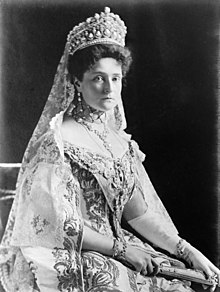| Alexandra Feodorovna | |||||
|---|---|---|---|---|---|
 Photograph by Boasson and Eggler, 1908 | |||||
| Empress consort of Russia | |||||
| Tenure | 26 November 1894 – 15 March 1917 | ||||
| Coronation | 26 May 1896 | ||||
| Born | Princess Alix of Hesse and by Rhine 6 June [O.S. 25 May] 1872 New Palace, Darmstadt, Grand Duchy of Hesse, German Empire | ||||
| Died | 17 July 1918 (aged 46) Ipatiev House, Yekaterinburg, Russian Soviet Republic | ||||
| Cause of death | Execution by firing squad | ||||
| Burial | 17 July 1998 | ||||
| Spouse | |||||
| Issue | |||||
| |||||
| House | Hesse-Darmstadt | ||||
| Father | Louis IV, Grand Duke of Hesse and by Rhine | ||||
| Mother | Princess Alice of the United Kingdom | ||||
| Religion | Russian Orthodox prev. Lutheranism | ||||
| Signature | |||||
Alexandra Feodorovna (Russian: Александра Фёдоровна; 6 June [O.S. 25 May] 1872 – 17 July 1918), born Princess Alix of Hesse and by Rhine, was the last Empress of Russia as the consort of Tsar Nicholas II from their marriage on 26 November [O.S. 14 November] 1894 until his forced abdication on 15 March [O.S. 2 March] 1917. A granddaughter of Queen Victoria, Alexandra was one of the most famous royal carriers of hemophilia and passed the condition to her son, Alexei Nikolaevich, Tsarevich of Russia.
Alexandra was deeply involved in the personal and political life of her husband, Tsar Nicholas II. Her reputation suffered due to her influence over Nicholas, particularly in her insistence on maintaining autocratic rule in the face of growing revolutionary pressures in Russia.[2] Her relationship with the Russian mystic Grigori Rasputin became a subject of controversy. Rasputin's alleged ability to alleviate Alexei's suffering from hemophilia increased Alexandra's reliance on him, damaging the public perception of the Romanovs and fueling rumors about Rasputin's power within the royal family. These associations with Rasputin and her opposition to political reform were seen as contributing factors to the collapse of the Romanov dynasty.
Following Nicholas II's abdication, the royal family were placed under house arrest by the Bolsheviks during the Russian Revolution. On 17 July 1918, they were executed by Bolshevik forces in Yekaterinburg, marking the violent end of over three centuries of Romanov rule. Despite her unpopularity during her reign, Alexandra was canonized as Saint Alexandra the Passion Bearer by the Russian Orthodox Church in 2000.
- ^ Weir, Alison (2011). Britain's Royal Families: The Complete Genealogy (reprint ed.). Random House. p. 307. ISBN 978-0099539735.
- ^ "The Russian Diary of an Englishman, Petrograd, 1915–1917". London : W. Heinemann. Retrieved 29 May 2019 – via Internet Archive.